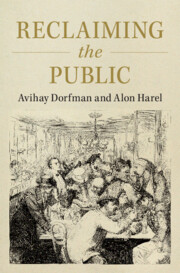Book contents
- Reclaiming the Public
- Reclaiming the Public
- Copyright page
- Dedication
- Contents
- Acknowledgments
- Introduction
- 1 A Public Conception of Political Authority
- 2 Law as Standing
- 3 Speaking in a Different Voice
- 4 Inherently Public Goods
- 5 Against Privatization as Such
- 6 Public Ownership
- 7 Why Not Artificial Intelligence?
- Concluding Remarks
- Index
Introduction
Published online by Cambridge University Press: 22 February 2024
- Reclaiming the Public
- Reclaiming the Public
- Copyright page
- Dedication
- Contents
- Acknowledgments
- Introduction
- 1 A Public Conception of Political Authority
- 2 Law as Standing
- 3 Speaking in a Different Voice
- 4 Inherently Public Goods
- 5 Against Privatization as Such
- 6 Public Ownership
- 7 Why Not Artificial Intelligence?
- Concluding Remarks
- Index
Summary
Reclaiming the Public defines and defends the intrinsic value of “the public” that resides in our public institutions and the officials that run them. The book argues that public institutions do not simply act for us but instead speak and act in our name; that is, they represent us. Representation requires that decisions made by public institutions or officials are consistent with the perspectives of citizens. If the decisions satisfy this requirement, these decisions are attributable to citizens, and citizens can be held responsible for them. This theory of political authority accounts for major features of our legal system, such as the noninstrumental grounds for the separation of law-making powers, the noninstrumental value of constitutions, the limits of privatization, the nature and value of public property, and the impermissibility of using artificial intelligence in setting certain policies and making certain decisions.
- Type
- Chapter
- Information
- Reclaiming the Public , pp. 1 - 13Publisher: Cambridge University PressPrint publication year: 2024

